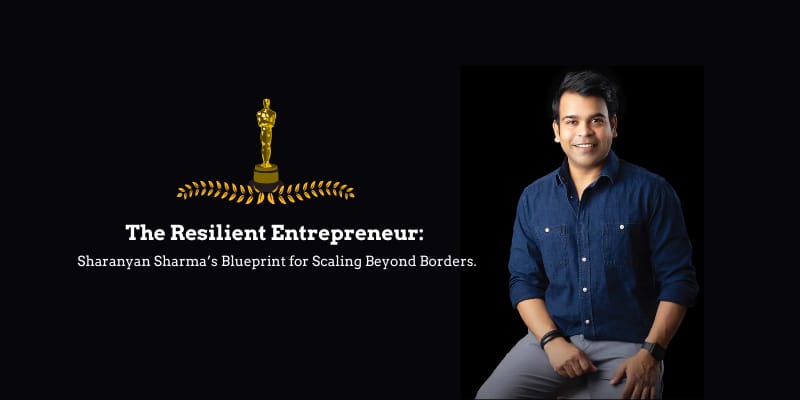Entrepreneurship is often glamorized as the pursuit of innovation, billion-dollar valuations, or Silicon Valley fairy tales. But in reality, most businesses don’t start in a polished boardroom with investor decks and seed funding. They start in survival mode—with nothing more than raw grit, scarce resources, and the will to make things work.
For Sri Lankan entrepreneur Sharanyan Sharma, this reality wasn’t a phase—it was the foundation. From launching his first company on a borrowed Pentium IV computer in a conflict-affected town, to steering Prime One Global into a multinational performance marketing powerhouse, Sharma’s journey illustrates how necessity, adaptability, and strategic reinvention can turn the smallest beginnings into global impact.
His story isn’t about chasing glory. It’s about building meaning—and in the process, rewriting what it means to scale from the ground up.
Building From Zero: A Startup Born Out of Survival
Sharma’s entrepreneurial journey began not with a plan but with a problem: how to pay tuition and cover living expenses as a university student in Colombo.
“I didn’t launch with a strategy,” Sharma recalls. “I started with a borrowed computer, a dial-up connection, and the need to survive.”
By day, he studied IT at SLIIT; by night, he drove a van part-time while taking freelance projects online. The digital economy was still in its infancy in Sri Lanka, but Sharma recognized its potential. The internet wasn’t just a tool—it was a lifeline, a way to bridge local limitations and connect to international opportunities.
His first venture, Extreme SEO, began as a one-man show delivering small projects to overseas clients. Every delivered project, every met deadline, became proof that resourcefulness could beat resource constraints. “Those early days taught me discipline more than any degree could,” he says.
Pivot to Prime One Global: From Services to Outcomes
As Extreme SEO grew, Sharma spotted a major industry shift. Clients no longer cared about vanity metrics like clicks or impressions; they wanted measurable outcomes. “What does this mean for my business?” became the defining question.
This gap led to the transformation of Extreme SEO into Prime One Global, a firm built not on promises but on proof. The pivot wasn’t cosmetic—it was structural. Sharma redefined the company around performance marketing, anchoring its model on three pillars:
- Precision: Data-driven strategies tailored to each market.
- Performance: Campaigns measured by impact, not activity.
- Partnerships: Long-term client relationships built on accountability.
The business soon expanded into global markets, with specialized focuses:
- United States: B2B performance marketing, helping tech firms lower customer acquisition costs and accelerate sales cycles.
- United Kingdom: Creative yet data-led strategies for e-commerce and direct-to-consumer brands.
- Europe: The launch of ALTI2UDE 1 OÜ in Estonia, specializing in business intelligence and MarTech automation.
This wasn’t about chasing trends; it was about solving real business problems. “We stopped talking about visibility,” Sharma explains. “We started talking about ROI.”
A Wake-Up Call: When Growth Exposed Fragility
Like many entrepreneurs, Sharma learned the hard way that strong sales don’t always equal strong businesses.
During a period of rapid growth, Prime One Global was onboarding clients, scaling campaigns, and hitting revenue milestones. On the surface, things looked perfect. But beneath the momentum, financial discipline was lacking. Margins were unclear, cash flow was inconsistent, and the company was being run like a startup founder’s hustle rather than a structured enterprise.
The breaking point came when a major client suddenly paused their campaign. “The rug was pulled out from under us,” Sharma admits. “It wasn’t just financial pressure—it was a mirror showing how fragile we really were.”
Instead of folding, Sharma took it as a turning point. He immersed himself in financial management, studied case studies, sought mentors, and restructured operations. Services became productized, financial cycles were tracked rigorously, and profit accountability was built into team structures. Finance moved from being a blind spot to becoming a competitive strength.
This transition marked Sharma’s evolution—not just as a founder but as a CEO.
Scaling Beyond Borders: Productization and Credibility
Taking a company global from Sri Lanka wasn’t luck; it was strategy.
The first major enabler was productization. Instead of billing by the hour, Prime One Global began offering defined service packages with clear deliverables and outcomes. This eliminated ambiguity, reduced friction, and made the company instantly scalable for international clients.
The second growth engine was credibility through results. Rather than pouring money into advertising, Sharma relied on consistent performance and client advocacy. One successful project in London led to a referral in Toronto. A strong partnership in Berlin opened doors in the Nordics. Word-of-mouth became the firm’s global expansion strategy.
Today, Prime One Global is pushing boundaries with neuromarketing initiatives in Canada and the Baltics, integrating behavioral science with performance-driven marketing. “It’s not about being loud,” Sharma notes. “It’s about being useful.”
Leadership Lessons: What Entrepreneurs Can Learn
Sharma’s journey offers a playbook for entrepreneurs navigating uncertain terrain:
- Start with what you have. Scarcity often breeds the sharpest innovation.
- Adapt before you’re forced to. The market evolves—pivot before clients demand it.
- Turn failures into frameworks. Crises reveal weak systems; fixing them creates lasting strength.
- Build credibility, not noise. Results-driven trust scales faster than ad spend.
- Global thinking starts local. Systems and productization make borderless business possible.
Each of these lessons underscores a larger truth: growth isn’t about chasing greatness—it’s about pursuing meaning and discipline.
A Message to the Next Generation
For young entrepreneurs, students, and small business owners, Sharanyan Sharma’s story is a reminder that impact is possible—even without privilege or perfect conditions.
“You don’t need a silver spoon or a straight path,” he says. “What you need is grit, curiosity, and the willingness to learn as you go. Every stumble is a step forward. Start small, stay humble, and keep moving.”
His journey from a borrowed computer in Sri Lanka to a multinational firm isn’t just a business success story—it’s proof that entrepreneurship, when fueled by resilience and meaning, can turn the smallest survival hustle into a global legacy.



































